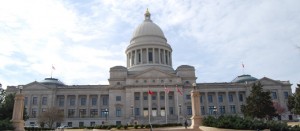Spending other people’s money can be pretty easy, especially if you tell yourself you have the authority and it’s for a good cause. In other words, we probably haven’t seen the last of the Legislature’s spending on local projects.
Here’s the back story. On Oct. 6, the Arkansas Supreme Court ruled that legislators can’t direct state surplus dollars to so-called General Improvement Fund (GIF) projects such as rural fire departments and libraries.
The ruling was the latest curve in a long legal road that began with a 2005 lawsuit by former legislator Mike Wilson. After the Supreme Court twice ruled in 2006 and 2007 against GIF funding, legislators instead sent the money to eight nonprofit regional planning districts that would decide how it was spent.
Only that’s not really what happened. As the Arkansas Democrat-Gazette has detailed, the planning districts often rubber-stamped the wishes of individual legislators. The Democrat-Gazette reported that taxpayers have spent more than $50 million on these projects just since 2013.
So Wilson sued again. This time, the Supreme Court ruled the process ran afoul of the state Constitution’s requirement that appropriations must be “distinctly stated.”
GIF = pork barrel spending
Another term for this kind of activity is “pork barrel spending.” At the federal level, it’s how taxpayers funded projects such as Alaska’s infamous “bridge to nowhere.” Congress supposedly ended its pork practice in 2012.
Pork barrel spending can be wasteful, inefficient and corrupt, as Arkansas taxpayers have seen recently. Former Rep. Micah Neal, R-Springdale, has pleaded guilty to receiving kickbacks from two entities – Ecclesia College, a private Christian school in Springdale, and the Decision Point addiction treatment facility in Bentonville. Basically, he’s admitted to funding those organizations and then receiving money from them in return. Former Sen. Jon Woods, R-Springdale, has pleaded innocent to similar charges and goes on trial Dec. 4. The Democrat-Gazette reported that in 2013, a highly questionable research outfit in Benton – which is nowhere near Springdale – was directed grants by Neal and Woods soon after it incorporated. It’s not apparent that the now-defunct Arkansas Health and Economic Research did anything productive with that money, or if it ever intended to.
Even when no laws have been broken, the process has encouraged legislators to be thoughtless and irresponsible with the taxpayers’ money. GIF funding lets lawmakers fund unworthy pet projects and reward politically connected constituencies. Two other current legislators directed money to Arkansas Health and Economic Research. Eleven current and former lawmakers directed a total of $717,500 to Ecclesia College. None are accused of wrongdoing so far.
Neal and Woods found themselves in court thanks to an FBI investigation, and the Capitol has long been abuzz with rumors that others would be caught in the net. Not surprisingly, this year legislators opted not to award any GIF money. Governor Asa Hutchinson wants to end the program permanently. And of course, now we have a definitive 5-2 Arkansas Supreme Court ruling.
Same song, different verse
So GIF funding is dead, right? Well, not so fast. We’ve heard this song before – twice, actually. When other people’s money can be given away, then court rulings can be worked around – at least until there’s another ruling. After all, while Congress has “banned” pork barrel spending in Washington, it’s still alive and well there. The watchdog group Citizens Against Government Waste reported recently that Congress had appropriated $6.8 billion worth of pork projects in the 2017 federal budget, double what occurred in 2012.
An argument can be made in favor of legislator-directed spending. Lawmakers are elected to represent local constituencies. If they can steer a little money to their rural fire departments – well, there are worse things than that.
I didn’t say it was an airtight argument, but it is an argument. And, eventually, future legislators will make that argument when taxpayer money is available and the FBI investigation is a fading memory.
© 2017 by Steve Brawner Communications, Inc.
